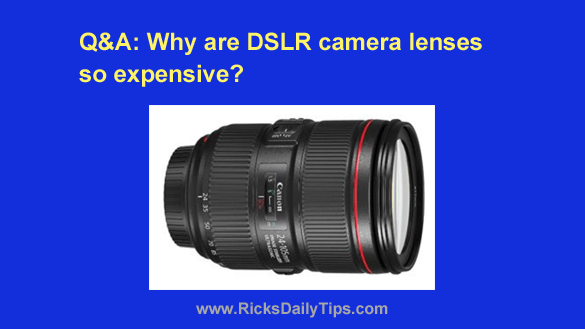Note: The links in this post are affiliate links.
Question from Carol: My daughter has enrolled in a professional photography class that’s scheduled to begin real soon.
One of the requirements for taking the class is to purchase a new DSLR camera and lens.
The instructor has provided a list of three cameras and seven lenses from which the students can choose, and he won’t allow substitutions of any kind.
She has decided to go with the cheapest Canon camera on the list because it fits within our budget.
The problem we’re having is choosing a lens. This is the cheapest lens on the list and it literally costs twice as much as the most expensive camera!
I think that’s ridiculous. Why on earth are camera lenses so much more expensive than the cameras themselves?
Also, do you know of anything I can say to the instructor to get him to change his mind and allow my daughter to use a less expensive lens?
Rick’s answer: I understand (and share) your frustration with the high prices of lenses, Carol.
I’m not sure why this instructor didn’t include a decent lower-cost lens on the list, but my guess is he thinks the students should buy a higher quality lens from the get-go since this is a class for aspiring pro photographers.
While there are lots of good lenses at affordable prices out there, most professional photographers do prefer to use professional class lenses to ensure that their photos are always of the highest possible quality.
And in case you’re wondering, the lens you mentioned above is actually an outstanding lens even though it’s the cheapest one on the list.
To answer your question, there’s actually a very good reason why high quality lenses are so expensive: They are expensive to design and build!
DSLR camera lenses typically contain a multitude of small parts that must be manufactured and assembled with extreme precision. Just one tiny error can render the lens completely unusable.
The parts in these precision devices must be milled and ground to exact measurements, with no deviation at all to speak of. And then those parts must be assembled just perfectly to create a precision lens.
As you might expect, that level of precision requires highly skilled workers and expensive equipment.
That being said, I do believe the instructor should have allowed a little more leeway in his students’ choices of equipment.
It certainly won’t hurt to explain your budget situation and see if he’ll make an accommodation, but if he won’t I’m afraid your daughter will have to spring for one of the recommended lenses if she really wants to take this class.
Update from Carol: Thanks for your explanation, Rick. It does make sense.
We’ve discussed this and I’ve decided to go ahead and buy that lens because my daughter has her heart set on taking this class. Thanks again for your help.
Bonus tip: This post explains why the ‘Nifty Fifty’ is my favorite camera lens of all.
